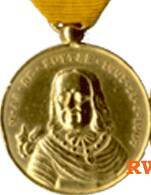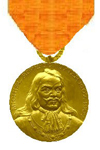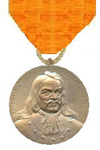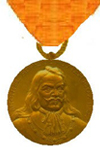De Ruyter-medaille
The De Ruyter Medal was instituted as "Honorary Badge for the Merchant Navy" by Royal Decree No. 1 of 23 March 1907 by Queen Wilhelmina.
Defined as : "Honor sign for skippers, mates and other members of the crew of merchant and fishing vessels and other persons who have committed themselves to Dutch shipping by meritorious deeds". It can, according to the decision, be awarded in gold, silver or bronze. Awards are made on the recommendation of the Council of Ministers and by Royal Decree.
In 1969 it was decided that the Ruyter Medal would only be awarded in gold, as it had led to discussions in the late 1960s about the awarding of this award. The reason for this was that the medal, which is primarily intended for seafarers, was in practice often awarded to persons who worked ashore. The Council of Ministers has therefore decided to more strictly interpret the criteria for awarding the Ruyter Medal that were established in 1907. By this the government thought that it could actually do more justice to the set-up. This decision concludes that the De Ruyter Medal is henceforth awarded to:
- Seafarers, who in the performance of their duties have been characterized by exceptional acts of seamanship.
- Those who have acquired special earnings for Dutch shipping through special nautical or marine technical achievements.
Royal Decree No. 51 stipulated that the decoration could be withdrawn because of "non-patriotic behavior" in World War II. In two cases, this "purge" by a special committee meant that the wearer had to return his medal in 1950. That a medal was"purified" can be considered as exceptional. The emphasis of the purification fell on the bearers of the Dutch orders of knights.
Prince Bernhard of the Netherlands was the honorary chairman of the committee for many years and often presented the medal.
The decoration is very rare.





